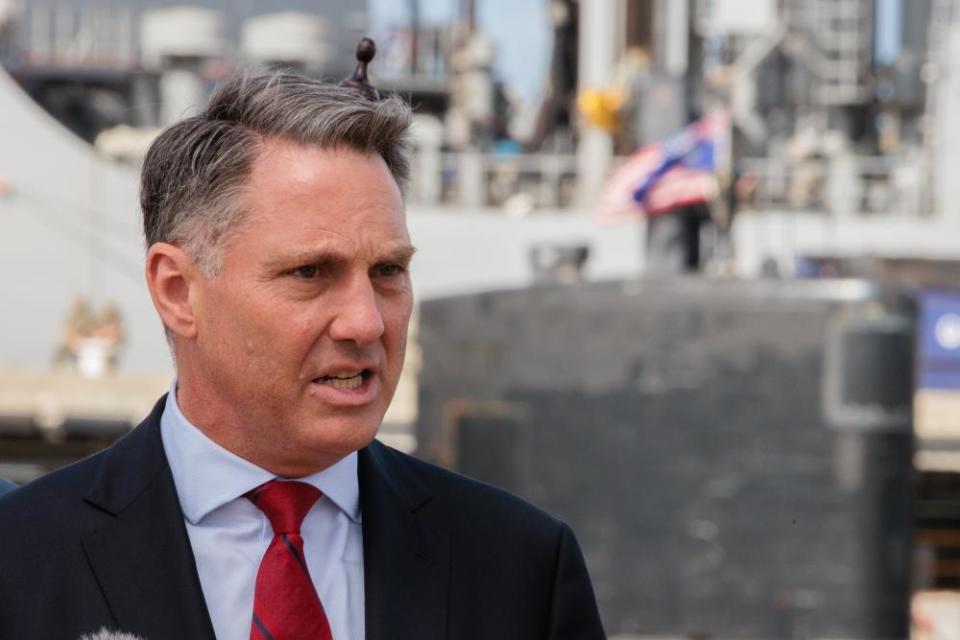Aukus nuclear submarine deal will be ‘too big to fail’, Richard Marles says

Australia’s nuclear-powered submarine deal with the US and the UK will rapidly become “too big to fail”, the deputy prime minister has said.
Richard Marles made the comment in an interview with Guardian Australia’s politics podcast, pushing back at the idea the multidecade Aukus plan could be vulnerable to political changes in both the US and the UK.
He also predicted that broader diplomatic efforts to stabilise the relationship between Australia and China would “continue largely unaffected by what has been announced during the course of this week”.
Related: Could a Donald Trump-shaped torpedo sink Australia’s $368bn Aukus submarine plans?
As the minister for defence, Marles has been at the centre of the Aukus planning. He said he had felt the “gravity” and “responsibility” of this week’s announcement of sweeping, staged plans that involve Australian spending of up to $368bn by the mid-2050s.
One point of contention has been the Australian promise to provide $3bn in funding over the next four years to subsidise the submarine production base in the other two countries, mostly the US, and what guarantees there were that the US would actually proceed with selling three to five Virginia-class submarines to Australia in the 2030s.
Asked what contracts or agreements sat underneath the high-level political commitment announced in San Diego this week, Marles said the project was “a shared endeavour of the three countries”.
Sign up for Guardian Australia’s free morning and afternoon email newsletters for your daily news roundup
“There is going to be a legal underpinning to this … and there is going to need to be a treaty-level document between our three countries, so there is a whole lot of legality which will be worked through,” Marles said.
“But in so many ways this transcends that [given] the sheer size of the decision to share this capability with Australia. And having taken the step of doing that, which we’ve done, puts all three countries in a position where it’s too big for it to fail on the part of any of those countries.”
Marles said all three countries were “deeply committed to each other’s success in this project” and that was what gave him “a sense of assurance that this is going to play out in the way that we want it to play out”.
“This must work for the US, this must work for the UK, as much as it must work for Australia,” he said.
Despite Beijing’s strong criticism of the Aukus deal this week – which has included labelling it a cold war-era pact that would be dangerous for the region – Marles said Australia’s push for a productive relationship with China would continue.
“China invests, obviously, in its own defence capabilities; we are doing that in respect of ours,” he said.
“In terms of the relationship between our two countries and the way in which we speak to each other and the way in which we engage, I really do think that the project of seeking to stabilise that will continue.”
Marles also addressed questions about whether the submarines could become obsolete, given that an Australian National University report, Transparent Oceans?, found that scientific and technological advancements predicted oceans were “likely” or “very likely” to become transparent by the 2050s.
“Just as there is a lot of effort going into illuminating the seas, there is a lot of effort going into creating more stealth around a submarine,” Marles said.
“You could flip the question and say: how confident are we that the veil of the sea will be lifted by 2050 such that we don’t need a submarine capability? Well, that would be a negligently risky call to make on the part of any Australian government.”
Marles said the fact many countries were investing heavily in submarines showed that they would be “really useful parts of military capability for decades to come”.
“But precisely because there is an effort to illuminate the sea is why a submarine capability, based on a diesel-electric power system, is going to be through the latter part of this decade and into the 2030s a comparatively diminishing capability, because more of that will be able to be seen.”
The International Campaign to Abolish Nuclear Weapons said this week that the best way for Australia to reassure the region about the submarine plan would be to sign and ratify the UN Treaty on the Prohibition of Nuclear Weapons.
It is Labor party policy to do so, but only “after taking account” of several factors, including the need for an effective verification and enforcement architecture and work to achieve universal support from other nations. The nuclear weapons states including the US have opposed the treaty, arguing it is out of step with the current security environment.
Marles said Australia wanted “a world where there are no nuclear weapons”, and had sent observers to the first meeting in Vienna last year.
“A meaningful contribution to the removal of nuclear weapons needs to involve the engagement of the countries which have the nuclear weapons,” he said.
“We completely get the intent of it, and we agree with the intent of it … but what the treaty needs to seek to achieve is universality in terms of those countries signing up to it, so that’s the issue.”
• The full interview with Richard Marles on Guardian Australia’s politics podcast will be released on Saturday morning

 Yahoo News
Yahoo News 